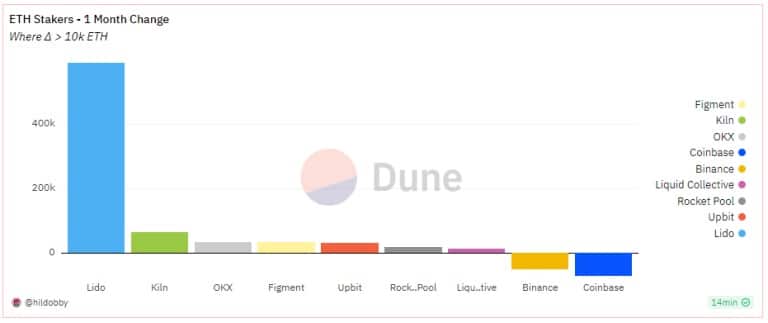The increasing centralisation of the Ethereum (ETH) blockchain has become a hot topic of concern. In a bid to keep the network decentralised, some Ether (ETH) staking protocols have taken the initiative to self-limit: they have pledged never to host 22% or more of Ethereum validators… But the giant Lido disagrees.
Ethereum staking protocols are taking action
As the centralisation of the Ethereum (ETH) blockchain becomes an increasingly important issue, some protocols offering Ether (ETH) staking have decided to restrict themselves. Specifically, they have pledged never to host 22% or more of Ethereum validators in order to keep the network decentralised.
Why keep to less than 22%? Ethereum’s structure requires that more than 66% (2/3) of validators agree to finalise a block. In other words, with such a limit, at least 4 entities hosting less than 22% of validators will have to agree if they wish to steer the blockchain in a malicious manner.
It is important to understand that by delegating their ETH, individuals using staking allow the protocols to participate in the network validation process. Although the reduced number of validation nodes reduces the time taken to finalise the process, it also affects the decentralisation of the network.
According to Ethereum contributor superphiz.eth, the Rocket Pool, Stakewise, Staderlabs and Diva protocols have already agreed to self-limit:
These providers are committed (or are in the process of committing) to self-limit to <22% of Ethereum validators. This is how our chain will be successful: Coordination above greed. Cooperation instead of winner-take-all.@Rocket_Pool @stakewise_io @staderlabs @divastakingWS
– superphiz. eth ️ (@superphiz) August 30, 2023
Since this tweet, other protocols have also come out in favour of this measure, including Puffer Finance and Swell. It should be noted that centralised Ether staking platforms such as Coinbase and Binance have not come forward, even though they respectively hold 8.7% and 4.5% of the ETH currently placed to secure the network.
It should also be noted that users of these centralised exchanges (CEX) seem to be losing interest in them in favour of other solutions, according to recent data:

But of course, the only protocol that is currently worrying about decentralisation is Lido, the Ether staking giant.
Why is Lido a problem for Ethereum’s decentralisation?
Lido, as a pioneer, is to date the largest ETH staking protocol by far: while the Ethereum blockchain has 822,640 validators, more than 266,000 of them are with Lido.
While the question is whether the protocols we are talking about should remain below 22% of validators, Lido already holds 32.37% of all ETH currently being staked, or more than 8.5 million at the time of writing.
In other words, that’s almost $14 billion.
So the 22% threshold we are talking about is already well exceeded by Lido. What’s more, while a governance vote was conducted through Lido’s decentralised autonomous organisation (DAO) to address this issue, 99.81% of those who voted said no, they did not want the protocol to impose a staking limit on itself.
The Ethereum community in general did not welcome this measure, as superphiz.eth put it:
Lido voted by a 99.81% majority not to self-limit. They have expressed an intention to control the majority of validators on the beacon chain.https://t.co/T16rTdM3gm
– superphiz.eth ️ (@superphiz) August 31, 2023
Back in May 2022, Vitalik Buterin spoke out about the centralisation of power on Ethereum. According to him, the solution to this could have been to limit the staking rewards on a protocol beyond 15% validators in order to direct newcomers towards other protocols:
Speculative controversial take: we should legitimize price gouging by top stake pool providers. Like, if a stake pool controls ☻ 15%, it should be accepted and even *expected* for the pool to keep increasing its fee rate until it goes back below 15%. https://t.co/cOtuM7Occd
– vitalik.eth (@VitalikButerin) May 14, 2022
” Controversial speculative view: we should legitimise price gouging by major participation pool providers. For example, if a pool controls more than 15% [of validators], it should be accepted and even *expected* that the pool will continue to increase its fee rates until it falls below 15% again. “
Lido’s success is mainly due to its liquid staking system through its stETH token, which is distributed to people wishing to stake their ETH on the protocol. These stETH can then be used through decentralised finance (DeFi) to generate returns.
In any case, Lido is closing in on the 33% threshold (half of 66%, in other words), which could give it the power to oppose the finalisation of certain blocks or even to resist forced slashing by the network… to be continued.
